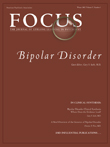The Role of Psychosocial Stress in the Onset and Progression of Bipolar Disorder and its Comorbidities: The Need for Earlier and Alternative Modes of Therapeutic Intervention
Abstract
Psychosocial stress plays an important role at multiple junctures in the onset and course of bipolar disorder. Childhood adversity may be a risk factor for vulnerability to early onset illness, and an array of stressors may be relevant not only to the onset, recurrence, and progression of affective episodes, but the highly prevalent substance abuse comorbidities as well. A substantial group of controlled studies indicate that various cognitive behavioral psychotherapies and psycho-educational approaches may yield better outcomes in bipolar disorder than treatment as usual. Yet these approaches do not appear to be frequently or systematically employed in clinical practice, and this may contribute to the considerable residual morbidity and mortality associated with conventional treatment. Possible practical approaches to reducing this deficit (in an illness that is already underdiagnosed and undertreated even with routine medications) are offered. Without the mobilization of new clinical and public health approaches to earlier and more effective treatment and supportive interventions, bipolar illness will continue to have grave implications for many patients’ long-term well being.



